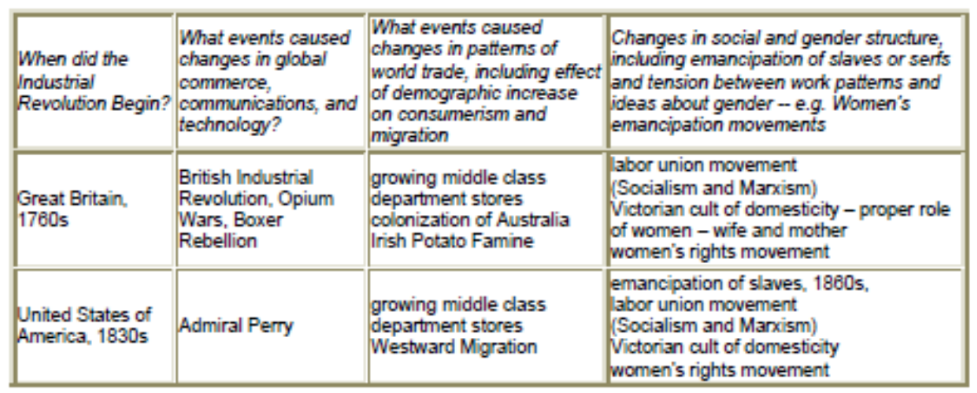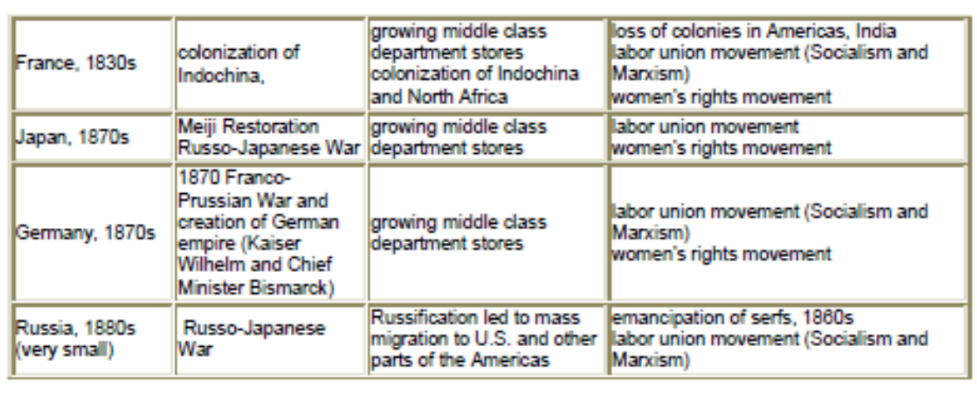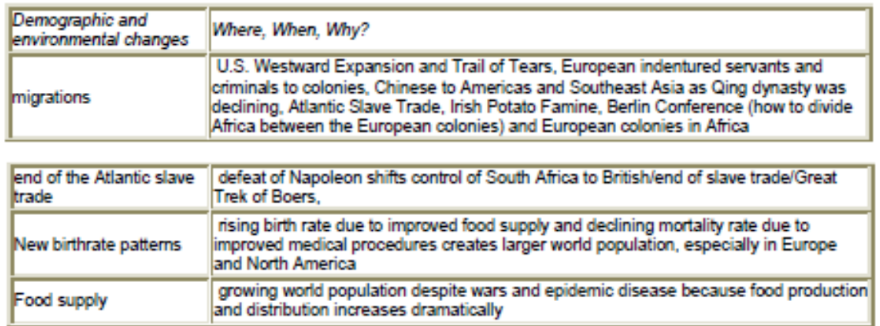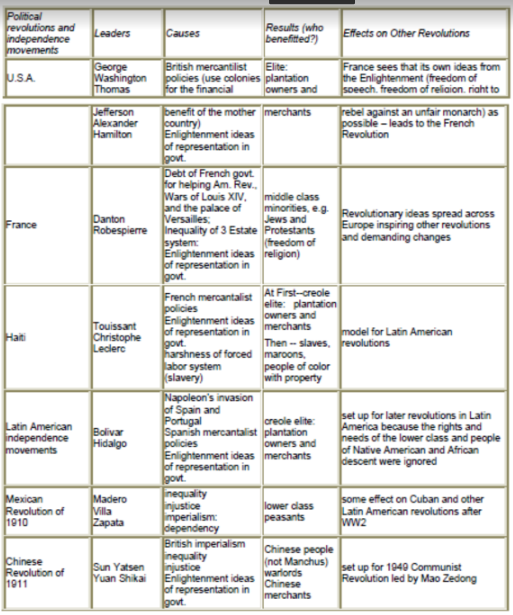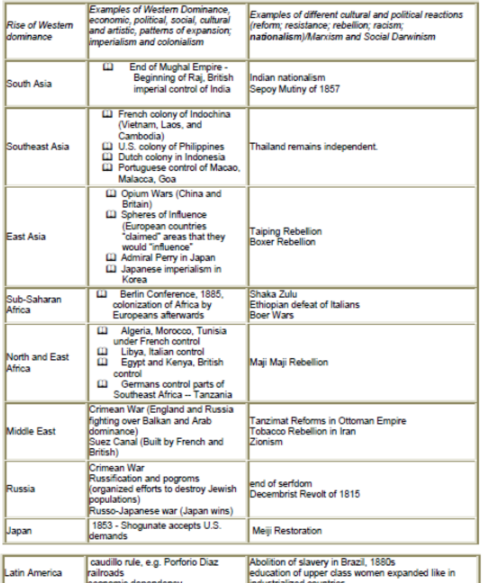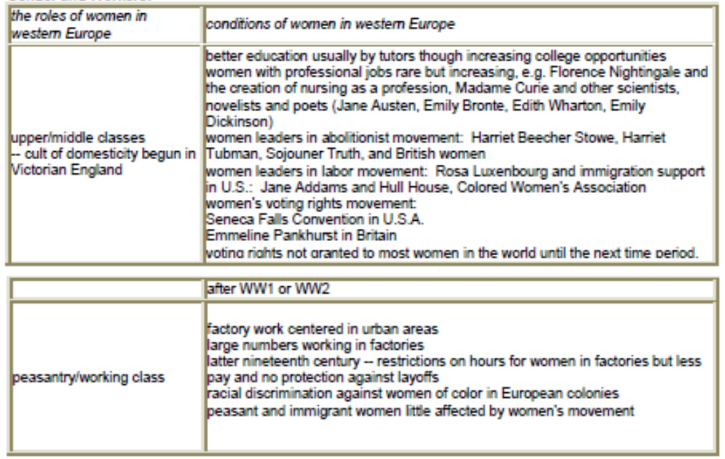cram packet 1750-1900
1/14
There's no tags or description
Looks like no tags are added yet.
Name | Mastery | Learn | Test | Matching | Spaced |
|---|
No study sessions yet.
15 Terms
Questions of periodization: What is unique to this time period that leads it to have its own “time?”
The west (Europe & the U.S.) becomes the major “player” in world events.
Beginning in the early 1700s, Europeans truly had a hold on “colonies” around the world.
World trading networks were dominated by the west, but they still impacted the world.
Countries either “have” industrialization and economic development or were “have nots”
Political, social, and economic revolutions swept the world during this time period.
o Enlightenment
o American and French Revolutions
o Haitian Revolution
o Industrial Revolution
o Rise of Capitalism and Adam Smith
o Unification of states (Germany, Italy, United States)
o Nationalism
o Imperialism
o Colonialism
major changes:
1) Suez and Panama Canals allowed for quicker travel times.
2) Technological advances in travel – ships, railroads, etc., increase travel of humans and goods worldwide.
3) Huge migration movements to the Americas from Europe and Asia.
4) Industrial Revolution set up mother countries that would have factories and they needed raw materials – colonies that only were used for raw materials. Economic advances and development were not carried out in countries controlled by Europe. Led to lack of development that still plagues Africa, Latin America, and parts of Asia today.
5) Serf and slave systems ended in most parts of the world.
6) Political revolutions and independence movements
Industrial Revolution:
Began in Great Britain because of economic and political stability. rich countries became richers, while other countries couldn’t keep up
Many countries in Latin America, sub-Saharan Africa, south Asia, and southeast Asia became highly dependent on one cash crop - such as sugar, cotton, and rubber
Despite the inequalities, the division of labor between people in countries that produced raw materials and those that
produced manufactured goods increased the total volume of world trade. In turn, this increased volume led to better
technology, which reinforced and fed the trade. Sea travel became much more efficient, with journeys that had once taken months or years reduced to days or weeks. By 1914 two great canals shortened sea journeys by thousands of
miles. The Suez Canal built by the British and French in the 1850s linked the Mediterranean Sea to the Red Sea, making it no longer necessary to go around the tip of Africa to get from Europe to Asia by sea. The Panama Canal, completed in 1913, did a similar thing in the western hemisphere, cutting a swath through Central America that encouraged trade and transportation between the Atlantic and Pacific Oceans.
Changes and Continuities in Social and Gender Structure:
growing population in rural areas and enclosure of land/large-scale farming sends more labor to urban areas leading to increase in size of industrial working class in industrialized economies; young women recruited to work in textile factories; children work in factories as well until child labor laws later in the nineteenth century
growing middle class due to industrialized economies' need for more white-collar workers, including teachers for public education when child labor laws enforce compulsory education; women are recruited to teach young children in public schools
Victorian cult of domesticity leads middle class women or those with middle class aspirations to imitate wealthy women by not working for pay; ideal is to have a servant at home to do domestic chores
Nobility lose privileges in industrialized countries
Political Revolutions and Independence Movements:
As the Industrial Revolution began in England; the economic changes were accompanied by demands for political changes that spread to many other areas of the world by the end of the 19th century. Two important forces behind the change were:
The influence of the Enlightenment - The 1700s are sometimes referred to as the "Age of Enlightenment," because philosophical and political ideas were begun to seriously question the assumptions of absolute governments. The Enlightenment began in Europe, and was a part of the changes associated with the Renaissance, the Scientific Revolution, and the Protestant Reformation, all taking place between 1450 and 1750. The Enlightenment invited people to use their "reason" using the same humanistic approach of Renaissance times. People can figure things out, and they can come up with better governments and societies. In the 1600s John Locke wrote that a ruler's authority is based on the will of the people. He also spoke of a social contract that gave subjects the right to overthrow the ruler if he ruled badly. French philosophes, such as Voltaire and Jean-Jacques Rousseau spread the new ideas to France, where they began uproar in a land that epitomized absolutism.
New wealth of the bourgeoisie - Ongoing commercialization of the economy meant that the middle class grew in size and wealth, but not necessarily in political power. These self-made men questioned the idea that aristocrats alone should hold the highest political offices. Most could read and write, and found Enlightenment philosophy appealing in its questioning of absolute power. They sought political power to match the economic power that they had gained.
Egypt:
Egypt was successful for a time in holding off the British Empire. Under the leadership of Muhammad Ali, who had fought against the Napoleonic armies, Egypt defeated the invading British army in 1807.
Muhammad Ali also
conquered parts of Sudan and founded the city of Khartoum. Later, Muhammad helped the Ottoman sultan fight the Greek rebels and invaded Syria to expand his empire.
In an effort to further advance Egypt, Muhammad Ali sought international financing of a plan to create a canal along the
Suez. Great Britain and France secured the funding. Conflicts arose over who would control the canal and for the most
part Egypt became controlled by the British.
What are the debates over the utility (usefulness) of modernization theory as a framework for interpreting events in this period and the next?
• The modernization theory says that as countries become more “modern” or “westernized” then their economies prosper, their political rights grow and their social systems (healthcare and education). Historically we have seen that most “developed” countries were once “developing” and that they desire to become rich directs everything else.
• The dependency theory says that countries will never “develop” because rich countries take advantage of them and take all their valuable resources. This leads these areas in a state of economic decline which never allows them to develop economically.
• Marxists would say that only through socialism will countries emerge economically.
What are the debates about the causes of serf and slave emancipation in this period, and how do these debates fit into broader comparisons of labor systems?
• Some say that from an economic standpoint, serfs and slaves were emancipated for purely economic reasons. Slaves are expensive to keep and as the economy changed from agricultural to industrial, they costs more than they were worth, so the practice died out. Serfs occupied land that they were bound to and as land went from being used for large scale farming to industrial, serfs were a liability and the only way to get “rid” of them was to free them and tell them to leave.
• Others might argue that people realized the social injustice of the situations and freed them for humanitarian reasons.
What are the debates over the nature of women’s roles in this period, and how do these debates apply to industrialized areas, and how do they apply in colonial societies?
• The roles of women did improve throughout this area for most parts of the world. In the west, women start receiving the right to vote, inherit, and own property. In the east, many countries still had limited rights. Some would argue that women were granted rights during this time period for economic reasons – so they could work in factories without parents’ permission, etc. Others would argue that women did not receive enough rights.
• In colonial societies, many times women had more rights. Colonies were experiments in themselves and “weak” women need not apply. Everyone had to contribute to the success of the colony and women’s roles were valued more than in some other areas. Women still were relegated to the home.
